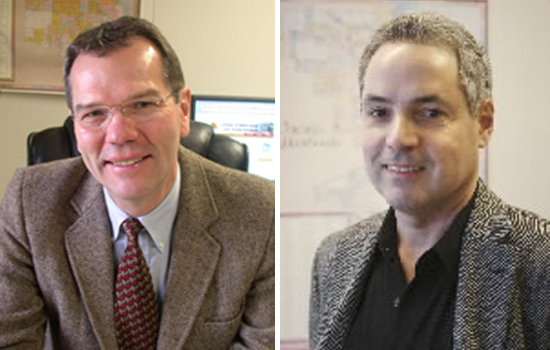Two UAlbany Criminal Justice Alumni Share 2011 Stockholm Prize for Criminology

UAlbany School of Criminal Justice alumni John Laub (left); and Robert Sampson, winners of the 2011 Stockholm Prize for Criminology. (Sampson photo courtesy of Kris Snibbe/Harvard University News Office)
Stockholm, Sweden (November 19, 2010) --
The leading international prize in the field of criminology has been awarded to two University at Albany alumni of the School of Criminal Justice, it was announced today.
John Laub, M.A. '76, Ph.D. '80 and Robert Sampson, M.A. '79, Ph.D. '83, were named joint winners of the 2011 Stockholm Prize in Criminology for their research into why and how criminals stop offending. Laub is director of the U.S. Department of Justice’s National Institute of Justice (NIJ). Sampson is currently Henry Ford II Professor of the Social Sciences at Harvard University.
Laub and Sampson will receive the prize on June 14, 2011, in a ceremony at Stockholm's City Hall. The award, judged by an independent international committee representing both practitioners and academics, will be presented in conjunction with the Stockholm Criminology Symposium.
"We are extremely proud two of our alumni have been recognized for their critically important contributions to the field of criminal justice," said University at Albany President George M. Philip. "This is further testament to the preeminent scholarship and achievement that has characterized UAlbany’s School of Criminal Justice for its entire 42 years."
The authors of the longest life-course study of criminal behavior ever conducted, Laub and Sampson discovered that even very active criminals can stop committing crimes for good after key "turning points" in their lives. These turning points included marriage, military service, employment, and other ways of cutting off their social ties to their offending peer group.
The findings, reported in their books Crime in the Making: Pathways and Turning Points Through Life (1993) and Shared Beginnings, Divergent Lives: Delinquent Boys to Age 70 (2003), as well as in numerous articles, have had broad influence in criminology world-wide. Laub and Sampson’s work has also influenced the policy debate about criminal justice and sentencing policy, especially concerning the potential for rehabilitation, and influenced other scholars to search for means by which offenders can be assisted to break their links to other offenders, such as by moving to new communities.
"I am so proud that, once again, two SUNY alumni have distinguished themselves by earning a prestigious award in their field," said SUNY Chancellor Nancy L. Zimpher. "Our graduates consistently make a difference in the world and this latest recognition further demonstrates our commitment to improving quality of life for all New Yorkers through education. I congratulate Dr. Laub and Dr. Sampson on their accomplishment and for serving as a prime example of the potential of our strategic plan, The Power of SUNY."
The Stockholm Prize was established under the aegis of the Swedish Ministry of Justice and is awarded for outstanding achievements in criminological research or for the application of research results by practitioners for the reduction of crime and the advancement of human rights.
John Laub, a distinguished professor in the Department of Criminology and Criminal Justice at the University of Maryland, was named director of NIJ, the research arm of the Department of Justice, this July. In 2002 he was elected President of the American Society of Criminology, which then awarded him their highest research prize, the Edwin H. Sutherland Award, in 2005.
He and Sampson have twice in conjunction won the Albert J. Reiss, Jr. Award for Distinguished Scholarship in Crime, Law and Deviance, once for each of their two books offering the findings of their life-course sample of criminal behavior.
Before being named Henry Ford II Professor of the Social Sciences, Sampson was chair of Harvard’s Department of Sociology. Currently on leave at the Russell Sage Foundation in New York, he was awarded the Edwin H. Sutherland Award from the American Society of Criminology (ASC) in 2002, and elected president of the ASC in 2010.
The Stockholm Prize is awarded annually, with the possibility of the prize being shared among co-recipients. The award amounts to at least 1,000,000 Swedish Krona, or about $145,000 in U.S. currency. Presented for the first time in June 2006, the prize is held in conjunction with the Stockholm Criminology Symposium.
![]() For more news, subscribe to UAlbany's RSS headline feeds
For more news, subscribe to UAlbany's RSS headline feeds
Educationally and culturally, the University at Albany-SUNY puts "The World Within Reach" for its 18,000 students. An internationally recognized research university with 58 undergraduate majors and 128 graduate degree programs, UAlbany is a leader among all New York State colleges and universities in such diverse fields as public policy, nanotechnology and criminal justice. With a curriculum enhanced by 300 study-abroad opportunities, UAlbany launches great careers. For more information about this globally ranked University, visit https://www.albany.edu/. For UAlbany's extensive roster of faculty experts, visit www.albany.edu/news/experts.shtml.


